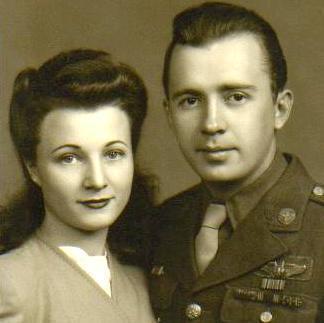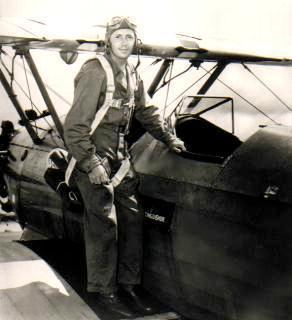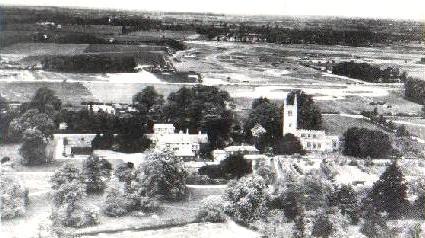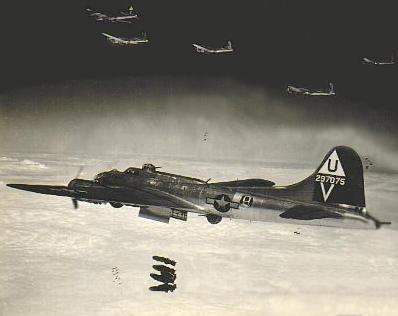|
 are acknowledged, affirmed and commemorated.
|
Posted on 01/15/2003 5:36:54 AM PST by SAMWolf
|
 are acknowledged, affirmed and commemorated.
|

|
|
|
Dairy of a Ball Turret Gunner  The emotional impact of combat is honestly portrayed in a diary my father, John J. Briol (Pictured with my mother, Marcella) wrote while flying on B-17s during WWII. He was a Ball Turret Gunner of the 457th Bomb Group, 748th Squadron at Glatton Air Field, England. The Pilot's Log, along with comments from the Co-Pilot and Toggalier (Bomb Release Switch Operator) are included. We were fortunate to have as Editor And Publisher, John F. Welch, Col. USAF Ret. Colonel Welch flew combat missions in WWII, staying with the Air Force through the Vietnam War, where he earned the Distinguished Flying Cross. "Dead Engine Kids," The book's title and name of the crew's plane, can be purchased online from the Amazon.Com Web Site. We had our toughest mission this morning so far. My stomach still has a sick feeling and my knees are still wobbly. We bombed Ruhland (Ruhleb). I'll start from the beginning. We got up at two o'clock this morning. It may take me a couple days before I feel like writing about these missions. I don't even like to think about them. Before we eat breakfast some of us who are Catholic go down before each mission for Absolution And Communion. When we go out to face death we can receive Communion without Confession or we can even eat breakfast before but it's not recommended. I feel much better when I can receive like that. Then we went down to briefing. They raised the curtain on the map where our route and mission were laid out. All the airmen groaned. We knew a lot of us wouldn't come back. All they did to console us was to say, "It's not pretty," and they let it go at that. The route was marked so we had to fly all the way across Germany to the other side to Ruhland. We had to pass near Berlin on the way. Our target was the synthetic oil refinery at Ruhland. They throw everything at you there, their rocket ships and everything, not to say anything about flak. After briefing we went to the equipment room where we keep all our flying equipment. We drew parachutes and harness and Mae Wests. We carry .45 automatic pistols in a shoulder holster. (We keep them with us in the hut.) We use electrically heated clothing, pants, coats, gloves and shoes, oxygen mask, helmet and goggles, flak suits, escape kit containing maps, compass, etc., in case one has to bail out or crash land in enemy territory. When you're in the ship you're a mass of wires. One to your throat mike, one to your headset, one to your electric suit and a hose to your oxygen mask. We get one B-4 bag to a ship which contains one extra thing of everything if something should go out on you. We pile all this stuff outside and then we go to the armour building for our machine guns. Before a mission we have to clean the oil off and check everything. We have to take the oil off or they'll freeze up at high altitude. After a mission we clean them and put the oil back on. We have to install them before every mission.  A truck takes us out to the plane. It has to be preflighted, guns put in and a million things checked. We put on all our equipment and take off. After we're over the channel we take our positions and pray that we'll see England again. We usually hit the coast of France, Belgium or Holland. We pass over the lines where we see the boys fighting it out on the ground below. We have to fight it out in the air over Germany. After we get into Germany the flak starts coming up at us but it's not so intense until we get to the target. Fighters won't bother us until we get close to the target, unless we're caught straggling along behind our formation. After hours of sweating it out and praying, we saw Berlin in the distance. It seemed to be smoldering from the pounding we're giving it. We passed near it a little to one side to avoid the intense flak. Then it happened so quick you couldn't think. We heard the report "bandits". they seemed to come from nowhere. The Nazi fighters came barreling through our formations before you could wink an eyelash. I watched terrified as three of our Fortresses went down in flames with their bomb loads and our buddies in them. I saw five men get out of one of them. The rest were lost. One of them kept falling, I never did see his chute open.  By this time I had my guns charged on as one came flashing by our ship. One of our escort fighters was on his tail, pouring lead into him. Besides that, a couple other Fortresses were giving it to him. You could have recognized the pilot if it weren't for his oxygen mask. He must have been dead as he went by. I think about 54 of our Fortresses and Liberators were lost on this raid. We had one engine gone but we kept up with the formation to the target at Ruhland and left it in flames. We turned around and beat it back across Germany. It wasn't long and another engine quit. I was never so scared in my life because we didn't have enough power to keep up with the formation. We couldn't keep up with them so we were left straggling across Germany on two engines and losing altitude. When you're all alone like that your greatest fear is enemy fighters ganging up on you. They were getting our range from the ground and the flak would come up and almost knock us down. We lost altitude down to about 10,000 ft. Then the engines seemed to hold us. God was with us though because we weren't attacked. Every time we saw a speck on the horizon we were terrified. We sweat it out for hours over Germany until we finally passed over the fighting lines into France, the happiest moments of our lives. We almost headed for Switzerland because it was closer but our engines managed to carry us back over the channel. Coming back from a mission and seeing the shore of England is the sweetest thing in the world.
|
If they flame you, they better have their fire suits on. I think you are correct.
In World War II, thousands of B-17 bombers flew over Nazi Germany, using millions of tons of bombs to reduce the German military industrial machine to rubble. In each bomber, a man sat in a glass bubble hung below the fuselage, his hands on the controls of an anti-aircraft gun designed to protect the planes from attacks from below.
?Flying the ball,? as the men who manned these exposed guns called it, was one of the most dangerous assignments of the war. But it was also essential to the survival of the bombers and?ultimately?the Allied victory. BALL TURRET GUNNERS uses extensive World War II combat footage and interviews with the men who performed this suicidal task to bring home the horror and danger that they experienced everyday. It is a portrait of danger that few will ever face, a harrowing glimpse into a deadly duty that was justified only by the dire circumstances of war.





Your account of John J. Briol and the B-17 Medal of Honor recipients testify to the courage of our bomber crews.
I have always found the statistics numbing beyond words: an example:
B-17s dropped over 640,000 tons of bombs in WWII and just over 5,000 were lost in combat.
Now the B-2 crews in Diego Garcia will be five hours away from Baghdad with a high certainty of returning unscathed.
They fight with such an advantage due to the epic courage of John J. Briol and his fellow airmen.
Godspeed swift victory and safe return to the finest fighting force on earth.
Saddam-free in '03.
Making Kim Jong ill thereafter.
Everytime I see photos or film footage of the bomber formations I get the mental image from my Mom's perspective. She can still describe the sights and sounds in detail.
I imagine so. That must be an unforgettable experience.



Disclaimer: Opinions posted on Free Republic are those of the individual posters and do not necessarily represent the opinion of Free Republic or its management. All materials posted herein are protected by copyright law and the exemption for fair use of copyrighted works.